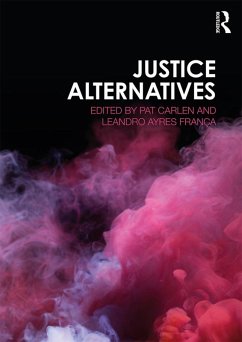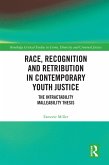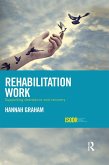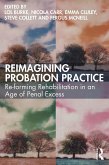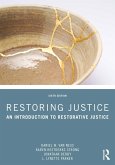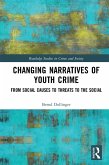Justice Alternatives (eBook, PDF)
Redaktion: Carlen, Pat; Ayres França, Leandro
48,95 €
48,95 €
inkl. MwSt.
Sofort per Download lieferbar

24 °P sammeln
48,95 €
Als Download kaufen

48,95 €
inkl. MwSt.
Sofort per Download lieferbar

24 °P sammeln
Jetzt verschenken
Alle Infos zum eBook verschenken
48,95 €
inkl. MwSt.
Sofort per Download lieferbar
Alle Infos zum eBook verschenken

24 °P sammeln
Justice Alternatives (eBook, PDF)
Redaktion: Carlen, Pat; Ayres França, Leandro
- Format: PDF
- Merkliste
- Auf die Merkliste
- Bewerten Bewerten
- Teilen
- Produkt teilen
- Produkterinnerung
- Produkterinnerung

Bitte loggen Sie sich zunächst in Ihr Kundenkonto ein oder registrieren Sie sich bei
bücher.de, um das eBook-Abo tolino select nutzen zu können.
Hier können Sie sich einloggen
Hier können Sie sich einloggen
Sie sind bereits eingeloggt. Klicken Sie auf 2. tolino select Abo, um fortzufahren.

Bitte loggen Sie sich zunächst in Ihr Kundenkonto ein oder registrieren Sie sich bei bücher.de, um das eBook-Abo tolino select nutzen zu können.
Bringing together 35 leading thinkers, analysts and campaigners from around the world, this collection presents a range of ongoing struggles for justice from abolitionist, transitional, transformative, indigenous, green, and restorative perspectives.
- Geräte: PC
- ohne Kopierschutz
- eBook Hilfe
- Größe: 32.74MB
Andere Kunden interessierten sich auch für
![Race, Recognition and Retribution in Contemporary Youth Justice (eBook, PDF) Race, Recognition and Retribution in Contemporary Youth Justice (eBook, PDF)]() Esmorie MillerRace, Recognition and Retribution in Contemporary Youth Justice (eBook, PDF)42,95 €
Esmorie MillerRace, Recognition and Retribution in Contemporary Youth Justice (eBook, PDF)42,95 €![Rehabilitation Work (eBook, PDF) Rehabilitation Work (eBook, PDF)]() Hannah GrahamRehabilitation Work (eBook, PDF)50,95 €
Hannah GrahamRehabilitation Work (eBook, PDF)50,95 €![Peer Mentoring in Criminal Justice (eBook, PDF) Peer Mentoring in Criminal Justice (eBook, PDF)]() Gillian BuckPeer Mentoring in Criminal Justice (eBook, PDF)42,95 €
Gillian BuckPeer Mentoring in Criminal Justice (eBook, PDF)42,95 €![Reimagining Probation Practice (eBook, PDF) Reimagining Probation Practice (eBook, PDF)]() Reimagining Probation Practice (eBook, PDF)37,95 €
Reimagining Probation Practice (eBook, PDF)37,95 €![Criminal Justice (eBook, PDF) Criminal Justice (eBook, PDF)]() Peter JoyceCriminal Justice (eBook, PDF)37,95 €
Peter JoyceCriminal Justice (eBook, PDF)37,95 €![Restoring Justice (eBook, PDF) Restoring Justice (eBook, PDF)]() Daniel W. van NessRestoring Justice (eBook, PDF)56,95 €
Daniel W. van NessRestoring Justice (eBook, PDF)56,95 €![Changing Narratives of Youth Crime (eBook, PDF) Changing Narratives of Youth Crime (eBook, PDF)]() Bernd DollingerChanging Narratives of Youth Crime (eBook, PDF)42,95 €
Bernd DollingerChanging Narratives of Youth Crime (eBook, PDF)42,95 €-
-
-
Bringing together 35 leading thinkers, analysts and campaigners from around the world, this collection presents a range of ongoing struggles for justice from abolitionist, transitional, transformative, indigenous, green, and restorative perspectives.
Dieser Download kann aus rechtlichen Gründen nur mit Rechnungsadresse in A, B, BG, CY, CZ, D, DK, EW, E, FIN, F, GR, HR, H, IRL, I, LT, L, LR, M, NL, PL, P, R, S, SLO, SK ausgeliefert werden.
Produktdetails
- Produktdetails
- Verlag: Taylor & Francis eBooks
- Seitenzahl: 412
- Erscheinungstermin: 11. Juli 2019
- Englisch
- ISBN-13: 9780429886843
- Artikelnr.: 57124008
- Verlag: Taylor & Francis eBooks
- Seitenzahl: 412
- Erscheinungstermin: 11. Juli 2019
- Englisch
- ISBN-13: 9780429886843
- Artikelnr.: 57124008
- Herstellerkennzeichnung Die Herstellerinformationen sind derzeit nicht verfügbar.
Pat Carlen is an English sociologist. She was co-founder (with Chris Tchaikovsky) of the UK campaigning group Women in Prison and Editor-in-Chief of the British Journal of Criminology 2006-2013; recipient of the American Society of Criminology's Sellin-Glueck Prize, the British Society of Criminology's Award for Outstanding Achievement and an honorary Doctorate of Laws from Lincoln University. She has published over 20 books including Magistrates' Justice and Women's Imprisonment. A biographical chapter is to be found in Fifty Key Thinkers in Criminology (Routledge 2010). A Criminological Imagination: Essays on Punishment, Justice, Discourse was published by Ashgate in 2010. Alternative Criminologies, edited with Leandro Ayres França, was published in 2017 by Canal Ciencias Criminais in Brazil and by Routledge in the UK. Leandro Ayres França is Professor of Criminology, Criminal Law and Criminal Procedure at Faculdade Estácio Rio Grande do Sul. He has a Master in Criminal Sciences by Pontifícia Universidade Católica do Rio Grande do Sul's (PUCRS) Criminal Sciences Graduation Program and is Coordinator of the Contemporaneous Criminologies Study Group, host of the radio program Café e Fúria, broadcasted by minima.fm. He is also author/editor of Ensaio de uma Vida Bandida (2007), Inimigo ou a Inconveniência de Existir (2012), Vestígios da Copa (co-authored with Alysson Ramos Artuso, Gisele Eberspächer, Henrique Valle, Leonardo Carbonieri Campoy, Maira da Silveira Marques and Uriel Moeller, 2014), and As Marcas do Cárcere (co-authored with Alfredo Steffen Neto and Alysson Ramos Artuso, 2016). For more information, visit: www.ayresfranca.com.
PART 1: Imagine 1. Justice alternatives: Imagine, experiment, debate 2.
Asking the domination question about justice 3. What price justice? The
failures of the left and the political economy of the future 4. Green
justice 5. Justice without crime and punishment? Security, harm and
compensation in a neoliberal world 6. Transformative justice and new
abolition in the United States 7. Resisting mass supervision: Reform and
abolition PART 2: Experiment 8. Democratic experimentalism and the futures
of crime control: Resources of hope for demotic times 9. The Hillsborough
Independent Panel and the UK state: An alternative route to 'truth',
'apology' and 'justice' 10. Legal mobilization, rights and social change in
Brazil: Reasons for optimism 11. Roads to freedom? Indigenous mobility and
settler law in Central Australia 12. Education for justice in the shadows
of neoliberal carceralism 13. Living in La La Land:'Snowflakes', social
change and alternative responses to sexual assault 14. Communicating
justice: Alternative judicial approaches 15. The non-criminalization
principle in accordance with the new Brazilian migration law 16.
Restorative justice for women's rights PART 3: Debate 17. Challenging the
desecration of the human spirit: An alternative criminological perspective
on safety and self-inflicted deaths in prison 18. Pathways to justice:
Indigenous democracy and the Uluru Statement from the Heart 19. Inequality
and punishment: Insights from Latin America 20. The other prices of
privatised justice: Marketing prison alternatives 21. Justice for rape
complainants: Limitations and possibilities 22. Alternative approaches to
criminal records: How can we achieve justice as fairness? 23. Cyber-risk
and restorative practices in schools 24. Youth in transition or young
people in the community? Alternative conceptions of the relevance of age in
shaping responses to young people in trouble with the law 25. The futility
and necessity of human rights in an era of carceral hyperinflation
Asking the domination question about justice 3. What price justice? The
failures of the left and the political economy of the future 4. Green
justice 5. Justice without crime and punishment? Security, harm and
compensation in a neoliberal world 6. Transformative justice and new
abolition in the United States 7. Resisting mass supervision: Reform and
abolition PART 2: Experiment 8. Democratic experimentalism and the futures
of crime control: Resources of hope for demotic times 9. The Hillsborough
Independent Panel and the UK state: An alternative route to 'truth',
'apology' and 'justice' 10. Legal mobilization, rights and social change in
Brazil: Reasons for optimism 11. Roads to freedom? Indigenous mobility and
settler law in Central Australia 12. Education for justice in the shadows
of neoliberal carceralism 13. Living in La La Land:'Snowflakes', social
change and alternative responses to sexual assault 14. Communicating
justice: Alternative judicial approaches 15. The non-criminalization
principle in accordance with the new Brazilian migration law 16.
Restorative justice for women's rights PART 3: Debate 17. Challenging the
desecration of the human spirit: An alternative criminological perspective
on safety and self-inflicted deaths in prison 18. Pathways to justice:
Indigenous democracy and the Uluru Statement from the Heart 19. Inequality
and punishment: Insights from Latin America 20. The other prices of
privatised justice: Marketing prison alternatives 21. Justice for rape
complainants: Limitations and possibilities 22. Alternative approaches to
criminal records: How can we achieve justice as fairness? 23. Cyber-risk
and restorative practices in schools 24. Youth in transition or young
people in the community? Alternative conceptions of the relevance of age in
shaping responses to young people in trouble with the law 25. The futility
and necessity of human rights in an era of carceral hyperinflation
PART 1: Imagine 1. Justice alternatives: Imagine, experiment, debate 2.
Asking the domination question about justice 3. What price justice? The
failures of the left and the political economy of the future 4. Green
justice 5. Justice without crime and punishment? Security, harm and
compensation in a neoliberal world 6. Transformative justice and new
abolition in the United States 7. Resisting mass supervision: Reform and
abolition PART 2: Experiment 8. Democratic experimentalism and the futures
of crime control: Resources of hope for demotic times 9. The Hillsborough
Independent Panel and the UK state: An alternative route to 'truth',
'apology' and 'justice' 10. Legal mobilization, rights and social change in
Brazil: Reasons for optimism 11. Roads to freedom? Indigenous mobility and
settler law in Central Australia 12. Education for justice in the shadows
of neoliberal carceralism 13. Living in La La Land:'Snowflakes', social
change and alternative responses to sexual assault 14. Communicating
justice: Alternative judicial approaches 15. The non-criminalization
principle in accordance with the new Brazilian migration law 16.
Restorative justice for women's rights PART 3: Debate 17. Challenging the
desecration of the human spirit: An alternative criminological perspective
on safety and self-inflicted deaths in prison 18. Pathways to justice:
Indigenous democracy and the Uluru Statement from the Heart 19. Inequality
and punishment: Insights from Latin America 20. The other prices of
privatised justice: Marketing prison alternatives 21. Justice for rape
complainants: Limitations and possibilities 22. Alternative approaches to
criminal records: How can we achieve justice as fairness? 23. Cyber-risk
and restorative practices in schools 24. Youth in transition or young
people in the community? Alternative conceptions of the relevance of age in
shaping responses to young people in trouble with the law 25. The futility
and necessity of human rights in an era of carceral hyperinflation
Asking the domination question about justice 3. What price justice? The
failures of the left and the political economy of the future 4. Green
justice 5. Justice without crime and punishment? Security, harm and
compensation in a neoliberal world 6. Transformative justice and new
abolition in the United States 7. Resisting mass supervision: Reform and
abolition PART 2: Experiment 8. Democratic experimentalism and the futures
of crime control: Resources of hope for demotic times 9. The Hillsborough
Independent Panel and the UK state: An alternative route to 'truth',
'apology' and 'justice' 10. Legal mobilization, rights and social change in
Brazil: Reasons for optimism 11. Roads to freedom? Indigenous mobility and
settler law in Central Australia 12. Education for justice in the shadows
of neoliberal carceralism 13. Living in La La Land:'Snowflakes', social
change and alternative responses to sexual assault 14. Communicating
justice: Alternative judicial approaches 15. The non-criminalization
principle in accordance with the new Brazilian migration law 16.
Restorative justice for women's rights PART 3: Debate 17. Challenging the
desecration of the human spirit: An alternative criminological perspective
on safety and self-inflicted deaths in prison 18. Pathways to justice:
Indigenous democracy and the Uluru Statement from the Heart 19. Inequality
and punishment: Insights from Latin America 20. The other prices of
privatised justice: Marketing prison alternatives 21. Justice for rape
complainants: Limitations and possibilities 22. Alternative approaches to
criminal records: How can we achieve justice as fairness? 23. Cyber-risk
and restorative practices in schools 24. Youth in transition or young
people in the community? Alternative conceptions of the relevance of age in
shaping responses to young people in trouble with the law 25. The futility
and necessity of human rights in an era of carceral hyperinflation
